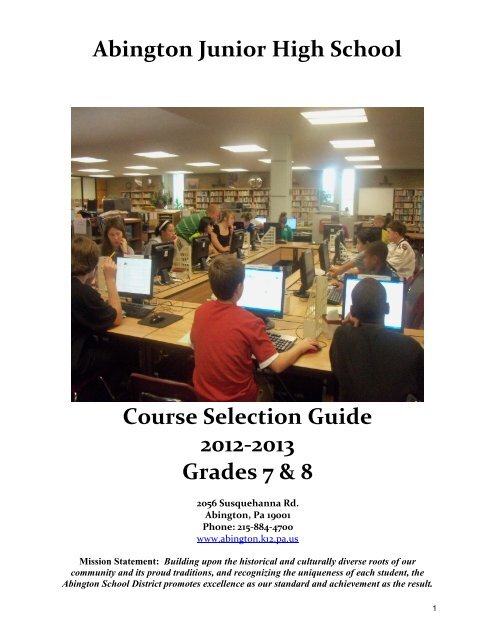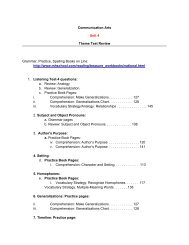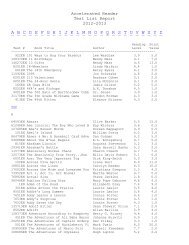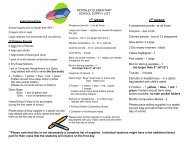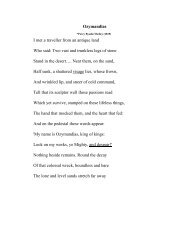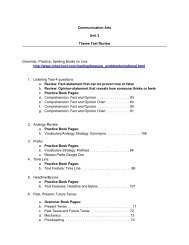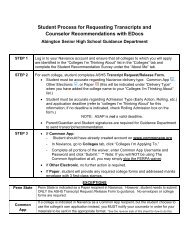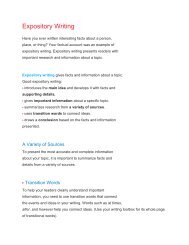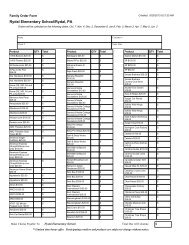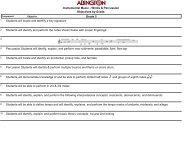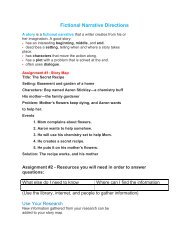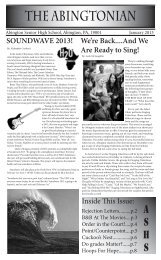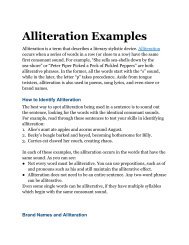Abington Junior High School Course Selection Guide 2012-2013 ...
Abington Junior High School Course Selection Guide 2012-2013 ...
Abington Junior High School Course Selection Guide 2012-2013 ...
You also want an ePaper? Increase the reach of your titles
YUMPU automatically turns print PDFs into web optimized ePapers that Google loves.
<strong>Abington</strong> <strong>Junior</strong> <strong>High</strong> <strong>School</strong><strong>Course</strong> <strong>Selection</strong> <strong>Guide</strong><strong>2012</strong>-<strong>2013</strong>Grades 7 & 82056 Susquehanna Rd.<strong>Abington</strong>, Pa 19001Phone: 215-884-4700www.abington.k12.pa.usMission Statement: Building upon the historical and culturally diverse roots of ourcommunity and its proud traditions, and recognizing the uniqueness of each student, the<strong>Abington</strong> <strong>School</strong> District promotes excellence as our standard and achievement as the result.1
INDEXIntroduction 4Academic <strong>Guide</strong>lines 5Counseling Program and Services 7<strong>Course</strong> Requirements 8<strong>Course</strong> DescriptionsArt 10Computer Literacy 11English 12Family and Consumer Science 13Health and Physical Education 14Mathematics 15Music 16Reading 17Science 18Social Studies 19Technology 20World Language 21Special Education 25Three-year Planning <strong>Guide</strong> 262
BOARD OF SCHOOL DIRECTORSThe outstanding quality of the educational program in the <strong>Abington</strong> <strong>School</strong>District through the years has been a reflection of the strong values that thepeople of the community hold for education. These values are perhapsnowhere better exemplified than in the high standards and strongeducational commitment of the Board of <strong>School</strong> Directors.Raymond McGarry, Esq.PresidentJeffrey P. Bates, Esq.Vice-PresidentSusan ArnholdDaniel S. KayeAndrea Lawful-TrainerJeannette F. MaitinAdam M. Share, Esq.Barry J. StupineMichele R. TinsmanAmy F. Sichel, Ph.D.Superintendent of <strong>School</strong>sPrincipal’s MessageAJHS <strong>Course</strong> <strong>Selection</strong> <strong>Guide</strong> – 7 th and 8 th grade is designed to help you havesuccess in the <strong>Junior</strong> <strong>High</strong> <strong>School</strong>. The selection of a program of studies is a seriousresponsibility. What you choose to study will greatly influence your future.The brief course and program descriptions included in this planning guide serve asan introduction to the opportunities and options available to you in 7 th and 8 th grade.This information should be discussed with your parents/guardians, counselors andteachers. The result can and should be a program of studies that reflects your past recordof achievement, your abilities and interests, and your goals.Dr. Mark Pellico3
INTRODUCTIONAcademic ProgramStudents at <strong>Abington</strong> <strong>Junior</strong> <strong>High</strong> <strong>School</strong> are able to take advantage of a flexiblecurriculum, which is tailored to meet individual needs. Elective programs includeofferings in Art, Business, English, Family and Consumer Science, Technology, Music,Social Studies and World Language.Daily Schedule<strong>Abington</strong> <strong>Junior</strong> <strong>High</strong> <strong>School</strong> operates an eight period daily bell schedule with optimalstudent learning as the focus.Bell Schedule8:10 8:55 Period 18:59 9:09 Homeroom9:13 9:58 Period 210:02 10:47 Period 310:51 11:12 Period 4a11:16 11:37 Period 4b11:41 12:02 Period 5a12:06 12:27 Period 5b12:31 12:52 Period 6a12:56 1:17 Period 6b1:21 2:06 Period 72:10 3:00 Period 84
Purpose of the <strong>Course</strong> <strong>Selection</strong> <strong>Guide</strong>This <strong>Course</strong> <strong>Selection</strong> <strong>Guide</strong> has been developed to assist you in the course selectionprocess. Please read this guide carefully. A meaningful school experience is dependentupon the courses you select. The most appropriate program of study is best achievedthrough the active collaboration of students, parents, counselors and teachers.<strong>Course</strong> availability will depend on the number of student requests and the availability ofhighly-qualified, certified staff. Every effort will be made to meet the individualeducational aspirations of <strong>Abington</strong> <strong>Junior</strong> <strong>High</strong> <strong>School</strong> students.ACADEMIC GUIDELINES<strong>Course</strong> <strong>Selection</strong> InformationRecognizing that students differ in talents, interests and skills, some courses are offeredwith different academic requirements and expected student achievement. Honors coursesare intensive, accelerated and enriched. They frequently require self-direction on thepart of students to budget time, manage workload, and meet class requirements.Required curriculum courses offer considerable challenge to students. <strong>Abington</strong> has ahistory of sending a large majority of its students to further educational experiences andin response to that need and expectation, a demanding program will be provided for all ofits students. These courses are carefully balanced between the self-direction of thestudent and the structure provided by the teacher.Teachers, counselors, and administrators carefully guide students with theirrecommendations for course placements. Students are advised to listen to this counseland seriously consider the recommendations of these professionals.Students and parents ultimately have the responsibility to decide on an appropriateprogram of studies. Students are not restricted to a particular course. Over time, manystudents are able to take greater and greater challenges. Some students may benefit froma more reduced pace; taking a mastery approach that will produce equal success. It is thegoal of <strong>Abington</strong> <strong>Junior</strong> <strong>High</strong> <strong>School</strong> to provide that flexibility for all students.The school day is divided into eight class periods of instructional time. To make the mostefficient use of coursework available at <strong>Abington</strong>, students are required to request afull course load of 32-35 class periods. Each year, students must register for courses inEnglish, Math, Science, and in Social Studies. Additional courses in World Language, andArts and Humanities are strongly suggested.<strong>Course</strong> Request & Schedule Change PolicyThe master schedule and the assignment of faculty are based on students’ courseselections made during the spring. Students are encouraged to make their courserequests consistent with their planned program and long-range educational goals. When5
students complete their course selection, they are making a commitment to complete thecourses requested.<strong>Course</strong>s will be offered based on enrollment and availability. If students request a coursethat is not included in the master schedule or cannot be included in their individualschedules, they will be scheduled for an alternate course. Students satisfactorilycompleting summer school by the end of July will be scheduled in the appropriatecourses subject to class availability.Once school begins, a student must have the recommendation of the current teacher ofthe course, the department chair, and his or her counselor to make a course change.HomeworkThe educators of <strong>Abington</strong> <strong>Junior</strong> <strong>High</strong> <strong>School</strong> believe that homework is a vital part of theprocess of education. <strong>Course</strong> work completed outside the classroom reinforces skills andknowledge enriching the student’s personal growth. One goal of education is to assiststudents to become responsible, capable, and independent life-long learners.Teachers are in the best position to diagnose the needs of their students and to stipulatehomework to meet those needs. Parents have an important role in providing theirchildren with the time, the support and the conducive environment for completingassignments at home. Students are responsible for completing their own assignmentsand for coming to class prepared every day.Grading SystemA = 90 – 100B = 80 - 89C = 70 - 79D = Passing grade 60 - 69E = Failing - eligible for Summer <strong>School</strong> 40% - 59%F = Failing – ineligible for Summer <strong>School</strong> 0 – 39%I = IncompleteW =Grade withheld and/or work incomplete6
COUNSELING PROGRAM & SERVICESGuidance ServicesThe Guidance program is developmental and comprehensive in design to help studentsrecognize their potential and become independent persons. The focus is to providestudents with the information they need to make wise decisions affecting theireducational and personal lives.<strong>School</strong> counselors assess students’ needs, identify the obstacles that may hinder studentsuccess, and advocate strategies to support learning and growth. Counselors workcollaboratively with parents and teachers to assist in course selection and post highschool planning. Students are also encouraged to consult with their teachers forrecommendations regarding course selection and placement.The junior high school counseling program includes: evening parent workshops,individual and group counseling, crisis intervention, classroom lessons and many othertypes of academic and emotional supportMany Counselors are members of the Student Assistance Program (SAP) whose mission isto collaborate as a team with students, parents, teachers and community agencies toidentify students at high-risk and to facilitate appropriate interventions. Teachers,parents, students or administrators may refer a student for this service.Psychological ServicesOur <strong>School</strong> Psychologists provide direct and indirect services to students, parents, andteachers. They work as part of various teams in order to support students. Teammembers work in a collaborative manner to address student needs in the generaleducation program. If the team or parent believes that a student may be in need ofspecial education services, the Psychologist coordinates the Evaluation process. Thisincludes gathering information from parents and teachers, completing classroomobservations, administering psychological and educational assessments and assisting inthe development of an Individual Education Program (IEP), if appropriate. Facilitatingcounseling groups, assessing student eligibility for Gifted Services and coordinating there-evaluation of special education programs are other Psychological activities.Gifted Support Services (PA Code Chapter 16)Students are determined to be eligible if they meet multiple criteria. A Gifted IndividualEducation Program (GIEP) is developed for eligible students. For more information,contact the Building Principal, Coordinator of Student Services, or the <strong>School</strong> Counselor.Special Education (PA Code Chapter 14)The District provides Special Education instructional programs and support services toschool-aged children who have been identified as eligible and in need of speciallydesigned instruction by an Evaluation Team and an Individual Education Program (IEP)Team. The instructional adaptations and individualized strategies are focused onmaximizing the student’s academic achievement and social-emotional growth. The7
District operates Learning Support and Emotional Support programs K-12. Personnelinclude a special education coordinator, special education teachers, instructional aides,psychologists, speech & language teacher and itinerant teachers for occupationaltherapy, physical therapy, vision and hearing.Protected Handicapped Services (PA Code Chapter 15)The District also provides services, related aids or reasonable accommodations for thoseindividuals identified as protected handicapped students. Students are eligible for aService Agreement if they have a physical or mental disability which substantially limits amajor life activity such as caring for oneself, performing manual tasks, walking, seeing,hearing, speaking, learning, breathing, or working. Plans are developed to providereasonable accommodations for the student to be successful in the general educationprogram. For more information, contact the Building Principal, <strong>School</strong> Counselor or theCoordinator of Student Support Services.COURSE REQUIREMENTS FOR GRADES 7 & 8Required <strong>Course</strong>sGRADE 7 GRADE 8English 7 English 8World GeographyAmerican HistoryMathematicsMathematicsScience 7 Science 8Reading or Critical ThinkingReading or Critical ThinkingHealth & PE 7 PE 8Art 7 General Music 8Computer Literacy 7 Exploring Technology 8Elective <strong>Course</strong>sGRADE 7 GRADE 8World Language (Choices below)World Language (Choices below)Band 7 Band 8Chorus 7 Chorus 8Orchestra 7 Orchestra 8Personal Development Family & Consumer Sciences 8Ceramics Art 8Multimedia TechnologyCeramicsFitness for LifeMultimedia TechnologyAdv. Multimedia TechnologyFitness for Life8
World Language <strong>Course</strong>s**Grade 7GermanFrenchSpanishMandarin ChineseGrade 8GermanFrenchSpanishMandarin Chinese**See course descriptions to determine course placement9
COURSE DESCRIPTIONSARTArt 7 (Required)The expectation for visual art for seventh graders is that they all complete the course saying, “I can make artsuccessfully.” They are ready to accomplish basic building skills that are empowering. The technique andtheory driven curriculum strives to broaden the student’s definition of what art can be. We explore art as ameans of communicating and celebrate the endless possibilities in creative problem solving. Projects coverdrawing, painting, design, and ceramic skills. Activities can be teacher directed, independent, orcooperative in nature.Art 8 (Elective)This course is designed for students of all levels & abilities. Students will be given the opportunity toexperience a variety of different art forms – both two – and three-dimensional- and to use the most currenttools and materials available to express themselves in art. To better appreciate and analyze works of art,students will also study related vocabulary, History, aesthetics, and criticism.Ceramics 7, 8 (Elective)This course is designed for students who love working in clay. Students will learn all aspects of sculptingusing “hand built techniques.” This is known as Slab and Coil and Bah relief. Students work at their ownlevel of experience. Student work is glazed and fired. Students work with both white clay and terra cottaclay.10
COMPUTER LITERACYComputer Literacy 7 (required)Computer literacy skills are taught within the context of subject area classrooms, and focus on usingcomputer applications to accomplish curriculum objectives. The Microsoft Office Suite, including Word,Excel, and PowerPoint; are used across the curriculum. Students also practice Internet research skills; whileproperly attributing their sources. Other topics of concern may be addressed, including Internet Safety andfile management.Multi-Media Technology (Elective grade 7 or 8)Students will explore the use of computer software in designing multimedia projects for demonstration &presentation purposes. These projects will utilize two major pieces of software: HTML Webpage Codingand MS PowerPoint. Students will have assignments and projects that may call for group work. Studentswill create numerous web sites in the second semester utilizing the HTML coding language. Some DesktopPublishing content will be explored in the Microsoft Publisher software.Advanced Multi- Media Technology (Elective Grade 8)Students must have already taken and passed Multimedia Tech. Students will explore the use of computersin designing multimedia projects for presentation purposes. Projects will utilize Internet Explorer,PowerPoint, GIMP (similar to PhotoShop), and HTML Webpage Coding. Students will also use a digitalcamera and Photo Editor/Manager. Students will create numerous LIVE web sites utilizing advancedHTML language. Students will be introduced to Windows MovieMaker.11
FAMILY AND CONSUMER SCIENCEPersonal Development – 7 th Grade Elective“Managing Myself” is the ongoing theme for this course. Focus will be on developing skills forindependence and self-sufficiency. Topics explored in this course are various aspects of food preparation forsimple snacks and meals, functions & dynamics of family environments, creative use of leisure time througha hand sewing project, team building & leadership skills, independent living skills, problem solving, as wellas personal safety issues. Each unit of study will encompass hands-on learning activities such as foodpreparation labs, hand sewing and mixed media journaling, in addition to group and individual learningactivities/lessons with a more traditional approach.Family and Consumer Science - 8th Grade ElectiveConsumer Awareness is explored with focus on marketing & advertising strategies, packaging, label reading,and product quality/value, in order to develop more informed decision making skills. Aspects forinterpreting Food Nutrition Labels, the “My Plate Model” for healthier eating and Dietary <strong>Guide</strong>lines areincorporated into meal planning activities.Child Development with components of nutrition, safety, age-appropriate expectations, and stages ofdevelopment is studied promoting responsible choices for personal well-being in addition to care-takingroles.Food Preparation overlaps both of these areas, incorporating safety, sanitation, measuring, recipe readingand meal planning. Students will also complete a hands-on creative project with fabric, to support craftsthat can be done in conjunction with the child care and consumer units.13
HEALTH and PHYSICAL EDUCATIONHealth – 7 th GradeStudents will be introduced to a comprehensive skill based curriculum with an emphasis on nutrition, fitness, decisionmaking, adolescence/puberty, bullying and substance abuse. There are a total of twenty-two classes covering theseimportant topics.Physical Education – 7 th and 8 th GradeThe physical education program will address both the needs of the individual and the diversity of the class. Eachstudent will have the opportunity to grow physically, intellectually, socially and emotionally. Through a broad range ofactivities that emphasize a positive approach to overall fitness and lifetime sports, students will have the opportunity toexplore, develop competence and view themselves in a positive light.Adapted Physical EducationThis is a diversified program for developmental activities, games, and sports for students with limitations or disabilitieswho may not safely or successfully participate in the regular physical education program. (Approval of the familyphysician and parent is required.)Fitness for Life – ElectiveThis course is designed for students looking to improve their fitness levels. There will be an introduction to fitnesstraining utilizing treadmills, free-weights and other training equipment. Nutrition component is part of the curriculumusing the computer labs Students are instructed on how to use testing equipment for heart rates and BMI. (No text:internet access at home is helpful).14
MATHEMATICSGrade 7:Honors Pre-AlgebraMathematics class for honors level math students. Students enrolled in this course will study pre-algebra and algebraconcepts from a traditional algebra textbook.Pre-Algebra Part IThis is a mathematics class for college prep level math students. Students enrolled in this course will study pre-algebraconcepts using the grade 7, Connected Mathematics Program.Math Plus 7This is a mathematics elective that meets two days per week to support students who are enrolled in Pre-Algebra Part I.Grade 8:Honors Algebra IMathematics class for honors level math students. Students enrolled in this course will study algebra concepts from atraditional algebra textbook.Pre-Algebra Part IIThis is a mathematics class for college prep level math students. Students enrolled in this course will study pre-algebraconcepts using the grade 8, Connected Mathematics Program.Math Plus 8This is a mathematics elective that meets two days per week to support students who are enrolled in Pre-Algebra PartII.15
MUSICChorus – grade 7Students will explore a wide variety of music from various cultures, styles and time periods from classical tomodern. Students will also engage in music learning through music reading, sight-reading, solfege, rhythmreading, vocal exploration and voice building. Chorus students are part of a constructive and positivecommunity of musicians. Choral students perform with their groups in 2 concerts per year. Attendance atthese concerts is a required part of the course. Previous singing experience is not necessary.Chorus – grade 8Students will explore a wide variety of music from various cultures, styles and time periods from classical tomodern. Students will also engage in music learning through music reading, sight-reading, solfege, rhythmreading, vocal exploration and voice building. Chorus students are part of a constructive and positivecommunity of musicians. Choral students perform with their groups in 2 concerts per year. Attendance atthese concerts is a required part of the course. Previous singing experience is not necessary.Band (Symphonic)This is offered to 7 th and 8 th graders who have played a musical instrument for at least one year. Repertoireincludes a range of musical styles including baroque, classical, romantic, popular, and Broadway musicals.The development of performance skills and the student's awareness and sensitivity to the aesthetic qualitiesof music are emphasized.Jazz BandThe A-Town Jazz Band is <strong>Abington</strong> <strong>Junior</strong> <strong>High</strong>’s competitive Jazz Band and one of the most successfulstudent extracurricular activities at <strong>Abington</strong> <strong>Junior</strong> <strong>High</strong>. Musicians are chosen based on auditions, andrehearse as an ensemble once a week. The band participates in several competitive jazz festivals, schoolperformances, and assemblies. Students are taught jazz fundamentals and the importance of improvisation.The A-Town Jazz Band is open to any student musician at <strong>Abington</strong> <strong>Junior</strong> <strong>High</strong>. Students must be part ofband, chorus, or orchestra, with the exception of electric guitar, bass, and piano students.Orchestra - grade 7This course is geared for the advanced beginner and intermediate string player. String playing techniquesinvolving bowings, fingerings, and tone production are emphasized and pursued through the use of scales,method books, and string literature. The orchestra performs music from a wide range of Baroque, Classical,Romantic and Contemporary composers, interweaved with discussions and projects that address historical,theoretical, expressive, technical, and general performance issues specific to the selected repertoire. Theprimary goal of string orchestra participation is to advance each student's individual musicianship andempower each student to pursue lifelong music making on an amateur or professional level.Orchestra - grade 8This course is geared for the intermediate and advanced intermediate string player. String playingtechniques involving bowings, fingerings, and tone production are emphasized and pursued through theuse of scales, method books, and string literature. The orchestra performs music from a wide range ofBaroque, Classical, Romantic and Contemporary composers, interweaved with discussions and projects thataddress historical, theoretical, expressive, technical, and general performance issues specific to the selectedrepertoire. The primary goal of string orchestra participation is to advance each student's individualmusicianship and empower each student to pursue lifelong music making on an amateur or professionallevel.16
READINGCritical Thinking for the Gifted 7Gifted students in seventh grade are enrolled in the Critical Thinking for the Gifted 7 course that meets twotimes per week. Literature selections for the course focus on the following themes: Immigration,Discrimination, Cultural Diversity, Fantasy, and Realistic Fiction. Strategies for developing critical thinkingskills related to reading selections and technology projects are emphasized in this course. Students will alsocomplete an independent study related to a chosen literature selection.Critical Thinking for the Gifted 8Gifted students in eighth grade are enrolled in the Critical Thinking for the Gifted 8 course that meets twotimes per week. Literature selections for the course focus on the following themes: Life in the NineteenthCentury United States, Modern Medicine, Memoirs and Realistic Fiction. Strategies for developing criticalthinking skills related to reading selections and technology projects are emphasized in this course. Studentswill also complete an independent study related to a chosen literature selection.Reading 7 and 8RAC (Reading Across the Curriculum) 7 and 8Students in seventh and eighth grade are enrolled in Reading classes that meet either two (RAC 7/8) or five(Reading 7/8) times per week. Emphasis is placed on achieving proficiency in the Pennsylvania AcademicStandards for Reading. All instruction is designed to foster reading comprehension with narrative andexpository selections. Emphasis is also placed on teaching students strategies to improve study skills,listening skills, content area/standardized test preparation, note-taking and research skills. Students readnovels, short stories, as well as magazines and newspaper articles from online databases, in addition to selfselectedmaterials. Textbooks from content area classes are used to teach reading strategies forcomprehending that material.17
SCIENCEScience 8The eighth grade course in science introduces students to many of the branches of the earth and space sciences. Areasof concentration include rocks and minerals, plate tectonics, hydrology, forces of erosion and soils, meteorology,oceanography, and astronomy. The course places emphasis on the geological structures found in Pennsylvania and theprocesses that formed them.Honors Science 8The eighth grade course in science introduces students to many of the branches of the earth and space sciences. Areasof concentration include rocks and minerals, plate tectonics, hydrology, forces of erosion and soils, meteorology,oceanography, and astronomy. The course places emphasis on the geological structures found in Pennsylvania and theprocesses that formed them. Students explore the content in greater detail than in the college preparatory course.Students complete an independent research project on a topic of their selection.Science 7The seventh grade course in science introduces students to the governing theories of the natural sciences. Studentsdevelop mastery over the specific vocabulary and lab processes in each area. Each marking period focuses on a differentbranch of the natural sciences. Four major units of study focus on environmental science, chemistry, physics, andbiology. The course places emphasis on developing laboratory skills, interpreting data, and communicating lab results.Honors Science 7The seventh grade honors course in science introduces students to many of the branches of the life sciences andphysical sciences. Four major units of study focus on environmental science, chemistry, physics, and biology. Studentsare expected to learn the content in great depth and to apply scientific principles in a variety of situations. Frequently,they are required to extend themselves through the completion of enrichment assignments. The course placesemphasis on developing laboratory skills, interpreting data, and communicating lab results. Students explore thecontent in greater detail than in the college preparatory course. Students complete an independent research project ona topic of their selection.18
SOCIAL STUDIESGrade 7:World GeographyThis is a college prep survey course of world geography based on the 5 themes & 6 elements of geography.Units of Study include map skills; the United States; Europe; Asia; & Africa. Each of these is subdivided byregion. Throughout the year, students will explore not only the physical geography of a given region, butthe history, economy, people and culture of the region as well.Honors World GeographyStudents enrolled in the honors level must be strong, independent readers, and highly motivated learners.The course moves at a faster pace and the planned course of study covers more material in and in greaterdepth than blended level. Projects and assessments are more difficult at the honors level and honorsstudents are required to complete independent, research-based extension activities each marking period.Grade 8:American HistoryIn this college prep course students will study of U.S. history from pre-colonial times throughreconstruction. The curriculum is set up to progress chronologically as well as thematically. Students willexplore the history of our nation in the context of government and politics, wars and conflicts, as well asscientific and cultural achievements.Honors American HistoryStudents enrolled in the honors level must be strong, independent readers, and highly motivated learners.The course moves at a faster pace and the planned course of study covers more material in and in greaterdepth than blended level. Projects and assessments are more difficult at the honors level and honorsstudents are required to complete independent, research-based extension activities each marking period.19
TECHNOLOGYExploring Technology - Required (8 th grade)This course is centered on aspects of modern technology. Students will set up real-world experiments usingthe wide variety of equipment provided. They will then follow computer-aided instruction to understandthe processes of how these new and emerging technologies work. Some examples of topics are AlternativeEnergy, Construction Technology, Electronic Communications, Basic Electricity, Computer Aided Design(CAD) and Aerospace Technology.20
WORLD LANGUAGESThe goals of the language courses offered at <strong>Abington</strong> <strong>School</strong> District grades 7-12 are to enable students to:Communicate in the language of study in the following modes.a. Interpersonal (speaking/writing/listening/reading in a two-way communication)b. Interpretive (listening/reading)c. Presentational (speaking/writing to an audience)Relate cultural information of the countries where the language is spoken.Communicate with individuals from the communities where the language is spoken.Analyze the concepts of culture and nature of language through comparisons of the language and English.Connect with other disciplines through the use of the language.The program of instruction exhibits the following characteristics:1. Student-Centered classrooms which provide a supportive non-threatening environment to help focus onpractice and communication.2. Communication-Based learning which emphasizes teaching and learning in the target language.3. Cultural and Global Learning which fosters an understanding, appreciation and acceptance of differentcultures through extensive use of authentic documents and direct interaction with members of other cultures.Culture is integral to the learning and is central to each thematic unit.4. Connections with Other Disciplines that build upon, reinforce and make connections with knowledgeacquired in other curriculum areas, while providing insight into the English language.5. Ongoing Proficiency-Based Assessments which focus on evaluating students’ overall abilities to use the targetlanguage for communication.Which Language Should I Choose?French: Bonjour, mes amis! French is the official language of 28 countries with 265 million people and is considered a“Critical Language” in the National Security Language Initiative (NSLI) because of the large number of Caribbean andAfrican countries that speak it. French-speakers are in demand in banking, tourism, national security and healthcare.It is the language in 50% of the foreign films watched in the US and the source of fine art and literature. It is estimatedthat approximately 15,000 words and expressions in English are derived from French; making it an excellent resource forSAT vocabulary.German: Ich finde Deutsch super! If you can read that, you are already well on your way! Come learn and experienceGerman, an international language with a very close relationship to English. Germany, the economic powerhouse ofEurope is also home to the best traveled tourists throughout the world and is the best language for those interested in afuture in international business. From Einstein to Rammstein, German truly is a global language that is recognized byover a 125 million speakers throughout the world.Mandarin Chinese: Ni hao! Mandarin Chinese is the most spoken language in the world with 720 million people andconsidered a critical language in the National Security Language Initiative (NSLI). In Asia and Europe, it is one of themost used languages in business and careers. China has a culture over 5,000 years old with a history of philosophy andmedicine that complements Western culture. Due to the different writing and sound systems in Mandarin Chinese,native English-speaking students generally take longer to be proficient. Students interested in studying Chinese shouldenter the program with the intention of completing the full sequence. This program prepares students to take the APChinese exam in the Chinese Simplified form from the College Board as the culminating course.Spanish: Hola! Bienvenidos! Spanish is the official language of 20 countries with 320 million speakers worldwide and isconsidered a “Critical Language” in the National Security Language Initiative (NSLI). Spanish is used in the communityfor social and career purposes: medicine, business, restaurant, and the service industry. Many popular artists in music,film, and art have a connection to the Hispanic world.A student may begin to study a language at level 1 at any grade level with the exception of Latin which beginsin 10 th grade.Most 4 year colleges require a minimum of 3 years of language study grades 9-12. <strong>Abington</strong> <strong>School</strong> Districtstrongly recommends a minimum of four years of language study and takes pride in the numbers of studentswho study languages for an even longer sequence. Studies have shown that long sequences of language studyresult in higher SAT scores over any other variable studied. Beginning language study in 7 th or 8 th grade setsthe foundation for a successful experience in language learning.21
For fluency and skills competency, three to five years of study of the same language is more desirable than twoyears of one language plus two years of another.*Chinese will continue to add a level as the students progress through the newly added program.For each language, there is a sequence of courses which provides a continuous, articulated program of studydesigned to prepare students for college entrance requirements, travel, careers and personal pleasure.FRENCH I PART 1No prerequisiteThis course is for 7 th grade students who are studying French for the first time. French 1 Part 1 begins the developmentof the 3 modes of communication in French: interpretive (listening and reading), interpersonal (two-waycommunication- listening and speaking, reading and writing) and presentational (speaking and writing to an audience).Students will learn to communicate about personal information, such as: self, family, friends, likes/dislikes, school,pastimes, as well as the basics like, numbers, alphabet, weather, etc. Students will gradually and appropriately beimmersed in an all-French classroom. The class progresses at a moderate pace to keep the students’ comfort level highin their attempts to communicate in a new language. A student at this level is expected to perform at the low to midnovice level: understanding and producing language in familiar and rehearsed situations. Texts and other ancillarymaterials focus on themes for daily communication.FRENCH I PART 2Prerequisite: successful completion of French 1 pt. 1This course is for 8 th grade students who completed French 1 Part 1 successfully. French 1 Part 2 continues thedevelopment of the 3 modes of communication in French: interpretive (listening and reading), interpersonal (two-waycommunication- listening and speaking, reading and writing) and presentational (speaking and writing to an audience).Students will expand on their ability to communicate about personal information, such as: self, family, friends,likes/dislikes, school, pastimes, as well as the basics like, numbers, alphabet, weather, etc. Students will quickly beimmersed in an all-French classroom. The class progresses at a moderate pace to keep the students’ comfort level highin their attempts to communicate in a new language. A student at this level is expected to perform at the low to midnovice level: understanding and producing language in familiar and rehearsed situations. Texts and other ancillarymaterials focus on themes for daily communication.HONORS FRENCH I PART 2Prerequisite: successful completion of French 1 pt. 1 with teacher recommendationThis course is for 8 th grade students who completed French 1 Part 1 with a high level of language comprehension andproduction. French 1 Part 2 Honors continues the development of the 3 modes of communication in French:interpretive (listening and reading), interpersonal (two-way communication- listening and speaking, reading andwriting) and presentational (speaking and writing to an audience). Students will expand on their ability tocommunicate about personal information, such as: self, family, friends, likes/dislikes, school, pastimes, as well as thebasics like, numbers, alphabet, weather, etc. Students will quickly be immersed in an all-French classroom andstudents are expected to communicate solely in French in the classroom. A student at this level is expected to performat the mid novice level: understanding and producing language in familiar and rehearsed situations. Texts and otherancillary materials focus on themes for daily communication.FRENCH INo prerequisiteThis course is for 8 th grade students who are studying French for the first time. French 1 begins the development of the3 modes of communication in French: interpretive (listening and reading), interpersonal (two-way communicationlisteningand speaking, reading and writing) and presentational (speaking and writing to an audience). Students willlearn to communicate about personal information, such as: self, family, friends, likes/dislikes, school, pastimes, as wellas the basics like, numbers, alphabet, weather, etc. Students will gradually and appropriately be immersed in an all-French classroom. The class progresses at a moderate pace to keep the students’ comfort level high in their attempts tocommunicate in a new language. A student at this level is expected to perform at the low to mid novice level:understanding and producing language in familiar and rehearsed situations. Texts and other ancillary materials focuson themes for daily communication.22
GERMAN I PART 1No prerequisiteThis course is for 7 th grade students who are studying German for the first time. This course begins the development ofthe 3 modes of communication in German: interpretive (listening and reading), interpersonal (two-waycommunication- listening and speaking, reading and writing) and presentational (speaking and writing to an audience).Students will learn to communicate about personal information, such as: self, family, friends, likes/dislikes, school,pastimes, as well as the basics like, numbers, alphabet, weather, etc. Students will gradually and appropriately beimmersed in an all-German classroom. The class progresses at a moderate pace to keep the students’ comfort level highin their attempts to communicate in a new language. A student at this level is expected to perform at the low to midnovice level: understanding and producing language in familiar and rehearsed situations. Texts and other ancillarymaterials focus on themes for daily communication.HONORS GERMAN I PART 2Prerequisite: successful completion of German 1 pt. 1This course is for 8 th grade students who completed German 1 Part 1 successfully. German 1 Part 2 Honors continues thedevelopment of the 3 modes of communication in German: interpretive (listening and reading), interpersonal (two-waycommunication- listening and speaking, reading and writing) and presentational (speaking and writing to an audience).Students will expand on their ability to communicate about personal information, such as: self, family, friends,likes/dislikes, school, pastimes, as well as the basics like, numbers, alphabet, weather, etc. Students will quickly beimmersed in an all-German classroom and students are expected to communicate solely in German in the classroom. Astudent at this level is expected to perform at the mid novice level: understanding and producing language in familiarand rehearsed situations. Texts and other ancillary materials focus on themes for daily communication.MANDARIN CHINESE INo prerequisiteThis course is for 7 th and 8 th graders who are studying Mandarin Chinese for the first time. This course begins thedevelopment of the three modes of communication in Mandarin Chinese: interpretive (listening and reading),interpersonal (two-way communication- listening and speaking, reading and writing) and presentational (speaking andwriting to an audience). In addition to the fundamentals of tonal speech, Pinyin, reading, and writing, students willlearn to communicate about personal information, such as: characteristics of oneself, family, dates, numbers, food,colors, likes/dislikes, clothing, etc. Chinese culture and history are introduced as well. Students are gradually andappropriately immersed in an all-Chinese classroom. A student at this level is expected to perform at the low to midnovice level: understanding and producing language in familiar and rehearsed situations.HONORS MANDARIN CHINESE IIPrerequisite: successful completion of Mandarin Chinese IThis course continues to develop the three modes of communication: interpretive (listening and reading), interpersonal(two-way communication- listening and speaking, reading and writing) and presentational (speaking and writing to anaudience). A student at this level is expected to perform at the mid to high novice level: communication in expandedresponses on everyday topics with an increase in accuracy. Students will learn further topics to extend communicationskills with more complexity. This course is designed for motivated students who have mastery of the basics in thelanguage. Students will become immersed in an all-Chinese classroom.SPANISH I PART 1No prerequisiteThis course is for 7 th grade students who are studying Spanish for the first time. This course begins the development ofthe 3 modes of communication in Spanish: interpretive (listening and reading), interpersonal (two-waycommunication- listening and speaking, reading and writing) and presentational (speaking and writing to an audience).Students will learn to communicate about personal information, such as: self, family, friends, likes/dislikes, school,pastimes, as well as the basics like, numbers, alphabet, weather, etc. Students will gradually and appropriately beimmersed in an all-Spanish classroom. The class progresses at a moderate pace to keep the students’ comfort level highin their attempts to communicate in a new language. A student at this level is expected to perform at the novice level:understanding and producing language in familiar and rehearsed situations. Texts and other ancillary materials focus23
on themes for daily communication. Cultural information is integrated for the beginning of exploration into the lives ofthe people who speak Spanish.SPANISH I PART 2Prerequisite: successful completion of Spanish 1 pt. 1This course is for 8 th grade students who completed Spanish 1 Part 1 successfully. Spanish 1 Part 2 continues thedevelopment of the 3 modes of communication in Spanish: interpretive (listening and reading), interpersonal (two-waycommunication- listening and speaking, reading and writing) and presentational (speaking and writing to an audience).Students will expand on their ability to communicate about personal information, such as: self, family, friends,likes/dislikes, school, pastimes, as well as the basics like, numbers, alphabet, weather, etc. Students will quickly beimmersed in an all-Spanish classroom. The class progresses at a moderate pace to keep the students’ comfort level highin their attempts to communicate in a new language. A student at this level is expected to perform at the low to midnovice level: understanding and producing language in familiar and rehearsed situations. Texts and other ancillarymaterials focus on themes for daily communication.HONORS SPANISH I PART 2Prerequisite: successful completion of Spanish 1 pt. 1 with teacher recommendationThis course is for 8 th grade students who completed Spanish 1 Part 1 with a high level of language comprehension andproduction. Spanish 1 Part 2 Honors continues the development of the 3 modes of communication in Spanish:interpretive (listening and reading), interpersonal (two-way communication- listening and speaking, reading andwriting) and presentational (speaking and writing to an audience). Students will expand on their ability tocommunicate about personal information, such as: self, family, friends, likes/dislikes, school, pastimes, as well as thebasics like, numbers, alphabet, weather, etc. Students will quickly be immersed in an all-Spanish classroom andstudents are expected to communicate solely in Spanish in the classroom. A student at this level is expected to performat the mid novice level: understanding and producing language in familiar and rehearsed situations. Texts and otherancillary materials focus on themes for daily communication.SPANISH INo prerequisiteThis course is for 8 th grade students who are studying Spanish for the first time. This course begins the development ofthe 3 modes of communication in Spanish: interpretive (listening and reading), interpersonal (two-waycommunication- listening and speaking, reading and writing) and presentational (speaking and writing to an audience).Students will learn to communicate about personal information, such as: self, family, friends, likes/dislikes, school,pastimes, as well as the basics like, numbers, alphabet, weather, etc. Students will gradually and appropriately beimmersed in an all-Spanish classroom. The class progresses at a moderate pace to keep the students’ comfort level highin their attempts to communicate in a new language. A student at this level is expected to perform at the novice level:understanding and producing language in familiar and rehearsed situations. Texts and other ancillary materials focuson themes for daily communication. Cultural information is integrated for the beginning of exploration into the lives ofthe people who speak Spanish.24
SPECIAL EDUCATION<strong>Abington</strong> <strong>Junior</strong> <strong>High</strong> <strong>School</strong> Special EducationEducating students with disabilities to address their individual learning needs and differences in the leastrestrictive environment is provided at <strong>Abington</strong> <strong>Junior</strong> <strong>High</strong> <strong>School</strong> consistent with Federal and State laws.The class and/or learning environment can range from itinerant to full time services in subject based specialeducation classes to all general education classes. To support our students within the general educationclassroom; students may receive resource room classes. Resource Room classes are not a study hall but aclass that focus on the following: creating study strategies, breaking down assignments in manageablechunks, additional test/quiz time as needed, developing, encouraging and fostering self-advocacy skill fortransitioning independency into the general education classroom.25
Three-Year Planning <strong>Guide</strong>SUBJECT GRADE 7 GRADE 8 GRADE 9ENGLISH H – English 7English 7SOCIALSTUDIESH – World GeographyWorld GeographyH – English 8English 8H- American HistoryAmerican HistoryH- English IEnglish IH- World HistoryWorld HistoryMATHEMATICSH – Pre AlgebraPre- Algebra – Part 1Math Plus 7H – Algebra – 1Pre- Algebra – Part 2Math Plus 8H – GeometryGeometryAlgebra 1Math Plus 9SCIENCE H – Science 7Science 7H - Science 8Science 8H – BiologyBiologyREADINGCritical Thinking for theGiftedReading Across theCurriculumReading 7Critical Thinking for the GiftedReading Across the CurriculumReading 8Reading 9WORLDLANGUAGEFrench , Part 1German, Part 1Spanish, Part 1Mandarin IHealth and PE 7Computer LiteracyArtELECTIVES: Band 7Chorus 7Orchestra 7Personal DevelopmentMulti-Media TechnologyFitness for LifeCeramicsH – French, Part 2French, Part 2French 1H- German, Part 2H – Spanish , Part 2Spanish, Part 2Spanish 1Mandarin IH - Mandarin IIPE 8General MusicTechnology EducationArt 8CeramicsBand 8Chorus 8Orchestra 8Family and Consumer Sciences 8Multi-Media TechnologyAdvanced Multi-MediaTechnologyFitness for LifeFrench 1French IIH - French IIH - German IISpanish ISpanish IIH - Spanish IIMandarin IH -Mandarin IIH -Mandarin IIIHealth and PE 9Law and YouTopics in World AffairsArt 9 (2 days)Art 9 (3 days)GraphicsCeramicsTheatre Arts/ActingJournalismFamily and Consumer Sciences 9World of FoodBand 9Chorus 9Orchestra 9Fitness for LifeLiteratureComputer Applications 9Intro to BusinessIntro to Computer ProgrammingAdvanced Multi-Media Tech26


